American Geosciences Institute
American Geosciences Institute: Earth Science Week: Soil, the Forgotten Resource
Here is a simple exercise that will allow you to compare the rates and amounts of erosion that result from various land uses.
American Geosciences Institute
American Geosciences Institute: Earth Science Week: What's Down There?
Students build a model to learn about the cycle of erosion and deposition by water and wind which deposits layer upon layer of rock, soil, and organic material to the surface.
TeachEngineering
Teach Engineering: The Earth Is a Changin'
This activity introduces and describes the main types of erosion (i.e., chemical, water, wind, glacier and temperature). Students learn examples of each type of erosion and discuss how erosion changes the surface of the Earth. Students...
CK-12 Foundation
Ck 12: Earth Science: Erosion by Streams
[Free Registration/Login may be required to access all resource tools.] Covers different kinds of erosion by surface water.
CK-12 Foundation
Ck 12: Earth Science: Erosion by Waves
[Free Registration/Login may be required to access all resource tools.] Describes erosion in landforms caused by waves.
CK-12 Foundation
Ck 12: Earth Science: Erosion by Wind
[Free Registration/Login may be required to access all resource tools.] How winds erode surfaces and form various terrain features.
CK-12 Foundation
Ck 12: Earth Science: Influences on Weathering
[Free Registration/Login may be required to access all resource tools.] Variables that affect the rate of weathering.
Read Works
Read Works: The History of Planet Earth
[Free Registration/Login Required] This informational text passage shares information about the history of the earth and its landforms. This passage is a stand-alone curricular piece that reinforces essential reading skills and...
Read Works
Read Works: What Happens When It Rains
[Free Registration/Login Required] An informational text about rain and why it is important. A question sheet is available to help students build skills in reading comprehension.
Utah Education Network
Uen: Vocabulary Words in Context
In this lesson plan, 5th graders will use context clues as they learn new science vocabulary words through listening, reading and discussing the new content. The terms are associated with the reshaping of the earth's surface.
Geography 4 kids
Geography4 Kids: Biosphere: Erosion
What is erosion? Here's a brief look at the process of erosion ..what it is, how it happens, effects. Useful for the younger researcher.
Sophia Learning
Sophia: Geology: Sedimentary Rocks
Listen to this podcast which explains the various processes that form sedimentary rock. [0:32]
Sophia Learning
Sophia: Weathering and Erosion
A quick overview of the processes of weathering and erosion which shape Earth's surface.
Scholastic
Scholastic: Dirtmeister's Science Reporters: Erosion
Dirtmeister describes erosion, how it works, different causes, and types of weathering. Included are questions to help get you thinking about erosion in your area.
University of Hawai'i
Hawai`i Space Grant Consortium: Wind Erosion (Lesson)
This lesson plan simulates the effects of wind erosion on sandy coastlines, and beaches.
Science Education Resource Center at Carleton College
Serc: Geologic Field Study: Investigating Coastal Features of Lake Superior
In this geologic field investigation, students investigate the coastal geologic features of the western side of Lake Superior, and then develop inferences on the origins of the current coastal features.
Utah Education Network
Uen: Blowing and Flowing
Students make predictions about the erosion of three types of soil. The three soil types contain varying amounts of vegetation. This investigation requires the construction of an erosion table. The activity takes only 45 minutes, but the...
American Geosciences Institute
American Geosciences Institute: Earth Science Week: Geologic Maps and Groundwater
This activity is designed to give students practice using a geologic map to understand how water shapes the land- and is stored within the land- in part of the Grand Canyon.
Better Lesson
Better Lesson: Interpreting Live Data
Learners will be using live data about volcanoes and earthquakes to look for patterns and understand why natural disasters may or may not be able to be predicted. Resources include helpful websites, a video of the lesson in action,...
American University
Deforestation in Madagascar
Gives history of Madagascar's cultural and economic development in relation to its land clearing practices. Cites biological species indigenous to the island, and their imminent destruction. Includes links to several case studies.
Bill Nye
Bill Nye: Erosion Explosion
This tutorial from Bill Nye demonstrates that freezing water expands, potentially cracking rock and causing erosion.
Annenberg Foundation
Annenberg Learner: Interactives: Rock Cycle: How Rocks Change
Find out how rocks and rock layers change with erosion and weathering.
Other
Laura Candler: Weathering, Erosion and Deposition [Pdf]
Students differentiate between weathering, erosion, and deposition in this lesson plan for students grades 4-6.
US Geological Survey
Usgs Earth's Water: Rivers and the Landscape
Describes the formation of rivers and the transport of soil and sediment. Links to related material is provided within the text.



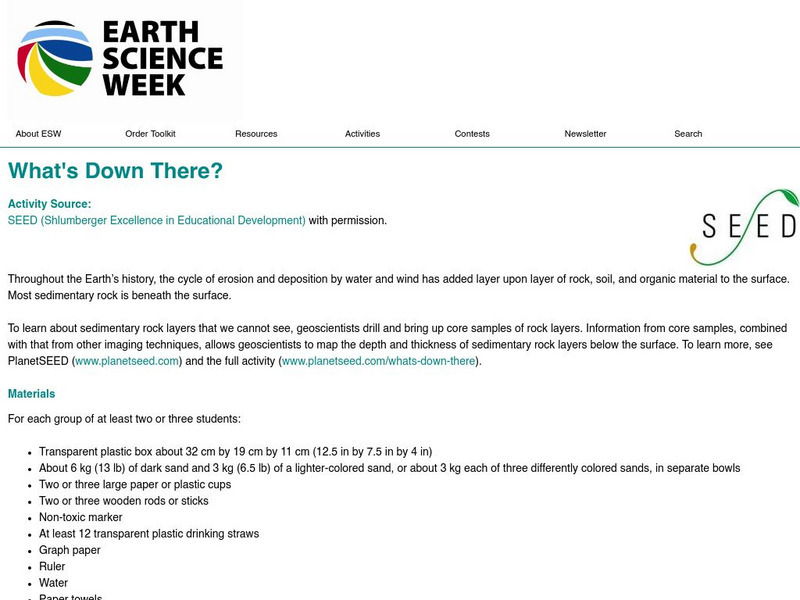





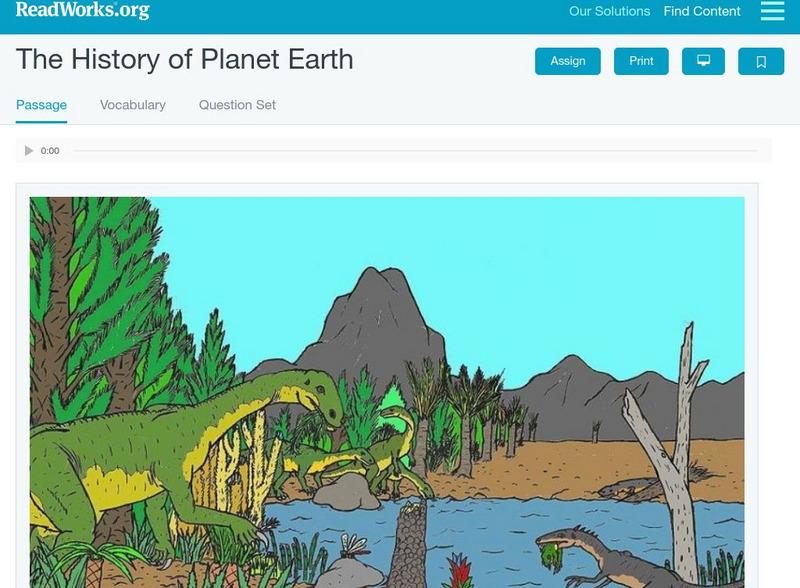

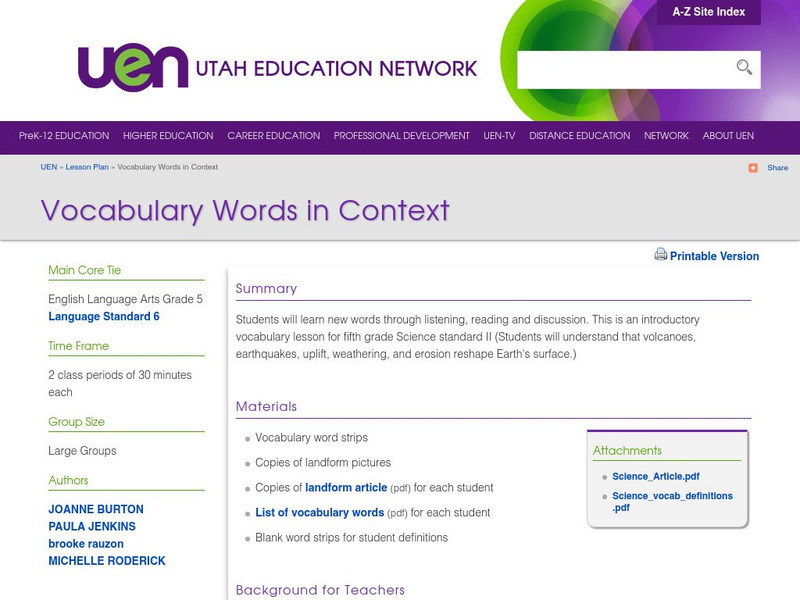




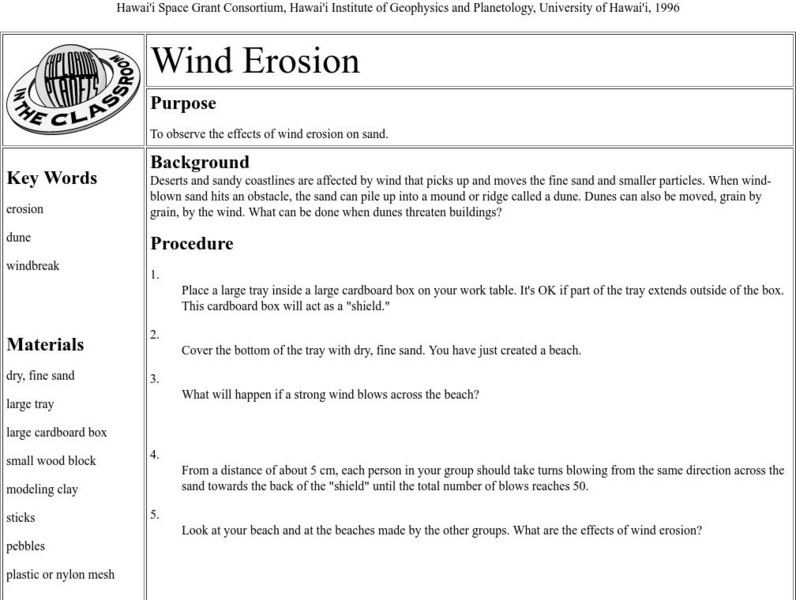



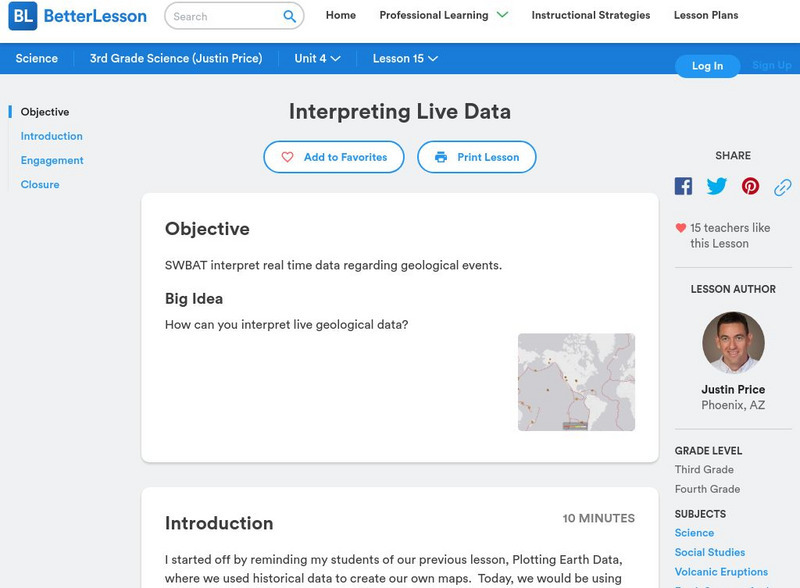

![Laura Candler: Weathering, Erosion and Deposition [Pdf] Lesson Plan Laura Candler: Weathering, Erosion and Deposition [Pdf] Lesson Plan](http://content.lessonplanet.com/resources/thumbnails/411259/large/bwluav9tywdpy2symdiwmduymc05mti2ltfva2exy2wuanbn.jpg?1589993171)